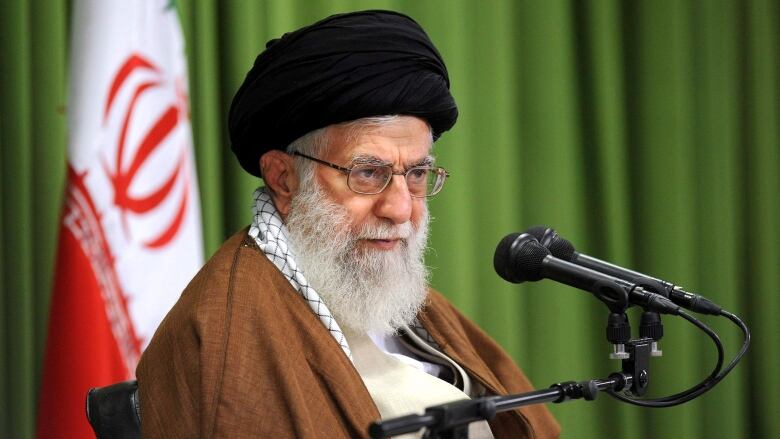Ayatollah affirms that U.S. is Iran's 'No. 1 enemy'
Ayatollah Ali Khamenei calls Trump's remarks on multilateral nuclear deal 'foolish'

The United States is Iran's "number one enemy" and Tehran will never succumb to Washington's pressure over a multinational nuclear deal, Iran's Supreme Leader Ayatollah Ali Khamenei said in a televised speech on Thursday.
U.S. President Donald Trump broke ranks with other major powers last month by refusing to formally certify Iran's compliance with the nuclear deal. Under that deal, most sanctions on Iran were lifted in exchange for Tehran curbing its nuclear work.
"The American president's foolish remarks against our people show the depth of America's hostility towards the entire Iranian nation," Iran's top authority Khamenei told a group of students. "America is the No. 1 enemy of our nation."
Since the deal was reached in 2015, Khamenei has continued to denounce the United States publicly, suggesting that antagonism between the two countries since the 1979 Islamic revolution in Tehran would not abate because of the accord. Iran and the United States severed diplomatic ties shortly after the revolution, when hardline students took 52 Americans hostage for 444 days.
Iran will mark the anniversary of the seizure of the American Embassy on Saturday. Trump has called the nuclear agreement, which was reached under his predecessor Barack Obama, "the worst deal ever negotiated," and has adopted a harsh approach to Iran over its nuclear and ballistic missile programs.
Washington has imposed new sanctions on Iran over its missile activity, calling on Tehran not to develop missiles capable of delivering nuclear bombs. Iran says it has no such plans and its missile programme is solely for defence purposes.
The deal's other signatories, Britain, France, Germany, Russia and China, and the European Union say Washington cannot unilaterally cancel an international accord enshrined by a UN resolution.
Iranian officials have repeatedly said that Tehran would stick to the nuclear accord as long as the other signatories respected it. But it has warned about the consequences if the deal falls apart.
"We will never accept their bullying over the nuclear deal ... Americans are using all the wickedness to damage the result of the nuclear talks," Khamenei said to chants of "Death to America" by students.
"Any retreat by Iran will make America more blatant and impudent ... Resistance is the only option."
Trump also accuses Iran of supporting terrorism in the Middle East. Iran rejects that and in turn blames the growth of militant groups such as the Islamic State in Iraq and Syria on the policies of the United States and its regional allies.
Shia-dominated Iran and its regional arch-rival, U.S.-backed Sunni Saudi Arabia, are involved in proxy wars across the region, backing opposite sides in Syria, Yemen, Iraq and Lebanon.
The comments came in the wake of Russian President Vladimir Putin visiting withKhameneiand President Hassan Rouhani in Tehran earlier this week.
"We oppose any unilateral change in the multilateral nuclear deal," Putin said said while meetingKhamenei, according to a statement from the supreme leader's office. "We oppose linking Iran's nuclear program with other issues includingdefensive issues."
Moscow has stood by Tehran while Trump has refused to recertify the nuclear deal.
While Gulf Arab states sought the protection of the U.S. after the 1991 Gulf War, Iran tilted toward Russia after a fraught history with the country earlier in the 20th century. Russia has supplied surface-to-air missiles to Iran, and helped it to build its first nuclear power plant, in the southern port city of Bushehr, which went online in 2011. The two countries are now partnering in the construction of two more nuclear reactors at the site.
With files from The Associated Press












_(720p).jpg)


 OFFICIAL HD MUSIC VIDEO.jpg)
.jpg)



























































































